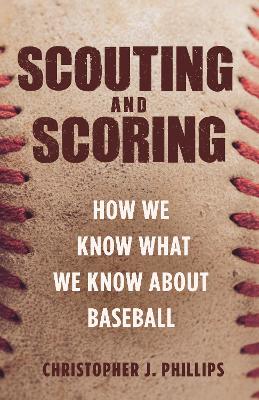An in-depth look at the intersection of judgment and statistics in baseball
Scouting and scoring are considered fundamentally different ways of ascertaining value in baseball. Scouting seems to rely on experience and intuition, scoring on performance metrics and statistics. In Scouting and Scoring, Christopher Phillips rejects these simplistic divisions. He shows how both scouts and scorers rely on numbers, bureaucracy, trust, and human labor in order to make sound judgments about the value of baseball players.
Tracing baseball's story from the nineteenth century to today, Phillips explains that the sport was one of the earliest and most consequential fields for the introduction of numerical analysis. New technologies and methods of data collection were supposed to enable teams to quantify the drafting and managing of players-replacing scouting with scoring. But that's not how things turned out. Over the decades, scouting and scoring started looking increasingly similar. Scouts expressed their judgments in highly formulaic ways, using numerical grades and scientific instruments to evaluate players. Scorers drew on moral judgments, depended on human labor to maintain and correct data, and designed bureaucratic systems to make statistics appear reliable. From the invention of official scorers and Statcast to the creation of the Major League Scouting Bureau, the history of baseball reveals the inextricable connections between human expertise and data science.
A unique consideration of the role of quantitative measurement and human judgment, Scouting and Scoring provides an entirely fresh understanding of baseball by showing what the sport reveals about reliable knowledge in the modern world.
- ISBN10 0691180210
- ISBN13 9780691180212
- Publish Date 26 March 2019
- Publish Status Active
- Publish Country US
- Imprint Princeton University Press
- Format Hardcover
- Pages 320
- Language English
- URL https://press.princeton.edu/titles/13390.html
